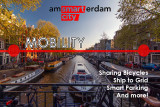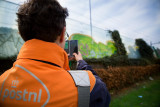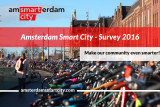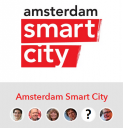Stay in the know on all smart updates of your favorite topics.
Organising Smart City Projects: Lessons learned from Amsterdam
The last two years, our partner the University of Applied Sciences systematically analysed 12 smart city projects in Amsterdam. In close cooperation with Amsterdam Smart City five researchers started a thorough evaluation of projects to draw lessons and make future smart city projects more effective.
The idea was to analyse the non-technological aspects of smart city projects
(partnerships, business models, scaling potential) since smart city solutions are not just about developing and applying technology. It demands new networking and management competencies. Solutions are not developed and implemented by one single company, but take shape in networks and with the involvement of citizens/end users. Partnerships are formed, they all work differently and face different challenges. In this study, a number of smart city projects in Amsterdam is analysed in their wider context.
This final report is now out and focuses on questions as:
- How do organisations with different agendas, collaborate on smart city projects?
- What challenges do they face?
- What kind of value is created?
- How are risks and returns shared, and how are users involved?
- What is the upscaling dynamic of smart city solutions, if any?
- How can smart city projects be managed professionally?
You can open the report below. This report is issued by the Amsterdam University of Applied Sciences and has been established in cooperation with Amsterdam Smart City.
On the 19th of December 2017 the insights of the report were shared at Pakhuis de Zwijger: https://amsterdamsmartcity.com/events/lessen-uit-een-slim-amsterdam
Are you interested in doing research together or do you have a smart city question? Get in touch via https://amsterdamsmartcity.com/projects/smart-entrepreneurial-lab.
Summary of the report here: https://drive.google.com/file/d/1ZexHe85DpGmpHjlPa9kam-TYUsUIR8Jp/view?usp=sharing
Welke vlogger wint droomopdracht ‘Chasing the Sun’ en mag het dak op in Amsterdam?

Kun jij een beetje shinen?
De Amsterdamse Zoncoalitie is gestart met een unieke zoektocht naar Amsterdamse vloggers met een duurzaam hart. De winnaar wint een stralende opdracht, een groot zakelijk netwerk en een prachtige reis voor 2 personen naar de zon.
Heb jij wel wat met de zon, heb je een leuke kop en durf je mensen te interviewen? Zet jouw overtuigende promotiefilmpje over Amsterdam dan live op je eigen kanaal. Stuur ons de link (info@zoncoalitie.nl) en zorg dat jouw vrienden je aanprijzen.
PS Je mag je zonnebril ophouden ...
Heb je vragen? Bekijk de website www.zoncoalitie.nl, mail, of bel met Bernard Klaassen (06 10 24 83 85)
Kun jij een beetje shinen?
De Amsterdamse Zoncoalitie is gestart met een unieke zoektocht naar Amsterdamse vloggers met een duurzaam hart. De winnaar wint een stralende opdracht, een groot zakelijk netwerk en een prachtige reis voor 2 personen naar de zon.
Heb jij wel wat met de zon, heb je een leuke kop en durf je mensen te interviewen? Zet jouw overtuigende promotiefilmpje over Amsterdam dan live op je eigen kanaal. Stuur ons de link (info@zoncoalitie.nl) en zorg dat jouw vrienden je aanprijzen.
PS Je mag je zonnebril ophouden ...
Heb je vragen? Bekijk de website www.zoncoalitie.nl, mail, of bel met Bernard Klaassen (06 10 24 83 85)
Mobility: Sharing bicycles and more initiatives!

One of the urban challenges of cities (and for Amsterdam) is mobility. How to provide reliable and sustainable mobility/infrastructures for citizens, employees and tourists?
A recent solution has been announced last week: sharing bicycles. At ‘De Zuidas’ in Amsterdam, the Hello Bike will be introduced in 2017. You can reserve and unlock your bike via an app on your phone. The initiator, Hello Zuidas, hopes to reduce traffic jams around the Zuidas by the ‘Hello Bike’.
Are there more examples of smart projects and products related to smart mobility? Yes, we will give you an overview of some interesting posts and projects about mobility which have been shared on our community. Do you have an interesting project or product related to mobility? Share them!
E-mobility & City Logistics
Electrical vehicles do not emit greenhouse gases and other air pollutants like NO2. The project E-mobility & City Logistics supports public and private organisations in their ambition towards zero emission transport in 2025. The project E-mobility & City Logistics aims to contribute to large scale implementation of electric vehicles for freight transport and service logistics in urban areas.
Did you know that Amsterdam has set up many goals related to electrical vehicles? For instance, in 2025, all city buses will be emissions free!
Amsterdam Practical Trial
All cars, navigation systems, traffic lights and information signs connected with each other and automatically working? In this project, innovations and new technologies are tested in Amsterdam. Amsterdam Practical Trial contributes to improve traffic flow, less congestion and a cleaner city. Which lessons did we learn?
Ship to Grid
Using green renewable energy for ships in Amsterdam. 200 shore power stations allowing ships to connect to green energy instead of on board diesel generators for their power supply, in the program Ship to Grid. Better for the water and air quality! The shore power is available through connections that use a pay-by-telephone system. With a single telephone call, the captain will be able to activate a connection with the shore power station by entering his personal code. Smart!
WeParc
WeParc is a valet parking and car services company allowing consumers to book their parking in the city through our mobile app. How it works? Let one of our drivers pick up your car, park it into one of our secured lots and return it whenever, wherever. It’s easy, reliable and affordable.
Request: Participants for on-demand parcel pick up
Wuunder offers an on-demand pick-up within one hour in Amsterdam. With only a mobile phone and a pen you can ship your parcel. One (bike) courier collect the shipments and will do the hand-over to multiple carrier companies. This avoids multiple parcel delivery vans within the city. Interested? We're looking for people that enjoy giving feedback to make our service even better.
E-mail: Info@WeAreWuunder.com
Picture: Pixabay.com
Smart city pilots: scaling up or fading out?
We studied 12 smart city projects in Amsterdam, and –among other things- analysed their upscaling potential and dynamics. Here are some of our findings:
First, upscaling comes in various forms: rollout, expansion and replication. In roll-out, a technology or solution that was successfully tested and developed in the pilot project is commercialised/brought to the market (market roll-out), widely applied in an organisation (organisational roll-out), or rolled out across the city (city roll-out). Possibilities for rollout largely emerge from living-lab projects (such as Climate street and WeGo), where companies can test beta versions of new products/solutions. Expansion is the second type of upscaling. Here, the smart city pilot project is expanded by a) adding partners, b) extending the geographical area covered by the solution, or c) adding functionality. This type of upscaling applies to platform projects, for example smart cards for tourists, where the value of the solution grows with the number of participating organisations. Replication is the third and most problematic type of upscaling. Here, the solution that was developed in the pilot project is replicated elsewhere (another organisation, another part of the city, or another city). Replication can be done by the original pilot partnership but also by others, and the replication can be exact or by proxy. We found that the replication potential of projects is often limited because the project’s success is highly context-sensitive. Replication can also be complex because new contexts might often require the establishment of new partnerships. Possibilities for replication exist, though, at the level of working methods, specific technologies or tools, but variations among contexts should be taken into consideration.
Second, upscaling should be considered from the start of the pilot project and not solely at the end. Ask the following questions: What kind of upscaling is envisioned? What parts of the project will have potential for upscaling, and what partners do we need to scale up the project as desired?
Third, the scale-up stage is quite different from the pilot stage: it requires different people, competencies, organisational setups and funding mechanisms. Thus, pilot project must be well connected to the parent organisations, else it becomes a “sandbox” that will stay a sandbox.
Finally, “scaling” is not a holy grail. There is nothing wrong when pilot projects fail, as long as
the lessons are lessons learned for new projects, and shared with others. Cities should do more to facilitate learning between their smart city projects, to learn and innovate faster.
(With a team of five researchers of the Amsterdam University of Applied Sciences (AUAS/HvA) we systematically analysed several smart city projects in Amsterdam. This post includes one of the key insights into the management of smart city projects. The report with all our findings will be published next week on the online platform Amsterdam Smart City).
Postal Services and Smart Cities: five pilots, three business models and difficult questions to be answered

Last September, the office of inspector general of US post published a report on postal services and smart cities. In a recent podcast, the authors of the report sketch three business models and five pilots for postal operators. The pilots are on using the postal trucks to measure the quality of the road (e.g. pothole detection), bridges (measuring vibrations on the bridge), air quality (sensors on a car) measuring the quality of underground water infrastructure (using long range Bluetooth transmitters) and measuring urban blight (using the local presence of the carrier).
Last September, the office of inspector general of US post published a report on postal services and smart cities. In a recent podcast, the authors of the report sketch three business models and five pilots for postal operators. The pilots are on using the postal trucks to measure the quality of the road (e.g. pothole detection), bridges (measuring vibrations on the bridge), air quality (sensors on a car) measuring the quality of underground water infrastructure (using long range Bluetooth transmitters) and measuring urban blight (using the local presence of the carrier).
There are many opportunities for using the postal networks as data collection networks. Interestingly, I see many postal operators working on the same kind of propositions. Read my earlier blogs for more examples from Spain and Belgium.
Not only the pilots several postal carriers conduct are comparable but also the discussion on business models. The first business model is to rent inches in postal trucks where a customer can place sensors in. The second one is to define what data may be interesting (and to whom) and to actually collect this data. The final business model is a “full service provider” model.
Of course, the full service provider business model is the most interesting, but also the one with the highest risk. If I, as a postal operator, invest my money in turning the network into an air quality measurement platform, who will be paying for this collected data? Questions like this one are the barriers for growth within the smart city domain and not only for postal operators, but also for producers of smart lights, smart parking sensors or smart bins.
Another issue arising from the podcast is how to deal with privacy concerns? Take the urban blight detection pilot for example. In this pilot, the mailman can inform the municipality with early signals of urban blight. The benefit of the postal service is that they are present in every street. The carrier can see when a house becomes vacant e.g. when mail is not picked up. Being able to capture the knowledge of the carrier would be a huge opportunity. You can collect the same kind of information in different cities and compare it. The question is to what extent and for what reason mailmen are willing to share information they have and society is willing the mailman to share this data. If postal operators are the data collectors of the smart city of the future, this question must be addressed in more detail.
Therefore, I’m happy to attend the Smart Cities and the Internet of Things (IoT) summit organized by PostEurop on November 24. As I wrote in an earlier blog, it’s my strong conviction that there is a brigt future for postal organizations. However, their license to operate should come from local neighborhoods, inhabitants and customers and not from government officials. I think there are three main conditions postal operators should have in mind and which I will bring to the summit:
Condition 1: Postal services are part of local communities
Postal operators have to think about their place within the local ecosystem of every neighborhood: we are a part of those communities and not ‘just’ a supplier or ‘just’ a data collector. Most of the postal workers (at least in the Netherlands) live as a neighbor in the area wherein they deliver mail and collect data. In terms of business models, postal organizations should therefore be transparent about their activities, actively involve (opt in) or inform (opt out) consumers in their propositions and ask local communities about their opinions on the services provided.
Condition 2: Trust in the Mailman, his Abilities and in the Corporate he works for
Asking postal workers to execute extra activities may sound attractive in PowerPoint presentations for decision makers, but in practice we have to realize that this ‘logic’ is not automatically seen by others. For example, mailmen checking elderly people need to have the personal trust of the elderly people (“I know you and you are a nice person”), in his abilities (“you are indeed able to have a good conversation with me”) and in the corporate asking him to do the extra job (“this is a brand I trust”). This three levels of trust will give the postal operator the license to operate within the smart city domain, as a trusted, able and nice partner within the local community.
Condition 3: Business Models with Societal Benefits
To be sure not to be detached from the local community and to keep the three levels of trust high, postal organizations should focus on business models with societal benefits. Such as data collection from public spaces in order to keep cities clean, pothole detection, checking health conditions of elderly people. Not surprisingly, it are these kind of models postal operators worldwide are developing. Doing good by doing business should be the motto of postal organizations in the smart city domain. If they do, they will also be a good alternative of criticized “big brother is watching you” projects which we also find in the Smart City domain.
Amsterdam Sharing City!
Cities, with their abundance and proximity of people and assets, are fertile ground for collaborative platforms.
Financing Smart Cities: Money Matters: Who Pays for the Smart City?
Number two out of five reads from Meeting of the Minds regarding the background of establishing a sustainable Smart City, like Amsterdam Smart City. This time with the focus on financing.
Survey - Amsterdam Smart City 2016

How do you use the online community of Amsterdam Smart City (this website)? What is your view on Amsterdam as smart city? And what are your expectations of this online community?
We are very curious about your answers. Please fill in this survey if you did not participate yet (5 minutes):
http://bit.ly/2fBZloc
Three copies of the book 'Smart City' from Anthony Townsend, a future classic, will be given away to the participants of this survey!
Nature Desks/ on the Open Mic stage of the Disruptive Innovation Festival
Dear relation, colleague or friend,
We would like to ask you whether you are interested in the future of work. Do you believe that our needs regarding work environments are changing? Does the combination work and urban green sound appealing to you?
We are proud to invite you to join us during a live online event of Nature Desks. We will be active on the Open Mic stage of the Disruptive Innovation Festival on 14 November 2016. This international event focuses this year on the theme #futureofwork.
Having a coordinating non-profit entity like Amsterdam Smart City acting as orchestrator, matchmaker and advocate for results-driven smart city collaborations"
Interesting read on "having a coordinating non-profit entity acting as orchestrator, matchmaker and advocate for results-driven smart city collaborations"
as the ideal enabler and successful approach for Smart City Strategy and implementation
Internship Community Amsterdam Smart City - Vacancy!

From January 2017 on, Amsterdam Smart City likes to welcome an intern! Are you looking for a place in the field of communications and communities? Do you feel like meeting a lot of people and get to know more about innovation in Amsterdam? Then we are looking for you! If desirable, we can switch this co-working internship into a research internship as well. (Article in Dutch)
Stage bij Amsterdam Smart City Community
Amsterdam Smart City (ASC) (www.amsterdamsmartcity.com) is hét innovatieplatform voor een toekomstbestendige stad. Bedrijven, overheden, kennisinstellingen en bewoners worden uitgedaagd slimme oplossingen te realiseren voor vraagstukken in Amsterdam en komen op het platform met elkaar in contact om deze te verbeteren en te versterken.
Stageplek
Vanaf januari 2017 hebben wij plek voor een initiatiefrijke stagiair. Heb je zin in een meewerkstage op het gebied van communicatie en communities, binnen een omgeving waar je verschillende partijen leert kennen en je je onderdompelt in de innovatie in Amsterdam? Dan zoeken we jou! Het aanpassen van de meewerkstage naar een onderzoeksstage is bespreekbaar.
Wie zijn wij?
ASC is in het voorjaar van 2016 een online community gestart. We hebben hier inmiddels meer dan 1600 leden. Zij hebben al meer dan 100 innovatieve projecten geplaatst en zoeken direct contact met andere innovators in de stad. We verwelkomen maandelijks meer dan 10.000 mensen op de site. We bereiken de community natuurlijk via de site, maar we verzenden ook een nieuwsbrief, hebben diverse social media kanalen en brengen de community tijdens offline events de mogelijkheid om kennis te delen. Daarnaast willen ons bereik in Amsterdam vergroten. Kortom, er zijn veel leuke dingen te doen. En daar betrekken we jou graag bij!
Wat ga je doen?
Dit is een indicatie van de taken:
• Het benaderen van bestaande leden en nieuwe leden voor de community
• Het bedenken en plaatsen van content van ASC voor de website
• Het beheren en bewerken van de geplaatste content door de community
• Het actief inzetten en beheren van social media om onze community verder onder de aandacht te brengen
• Het vormgeven en organiseren van events in samenwerking met het team en onze partners.
Wie ben je?
• Je bent een student met een relevante universitaire of hbo-opleiding
• Je bent initiatiefrijk, zelfstandig en flexibel
• Je hebt affiniteit met de thema’s duurzaamheid, technologie en innovatie
• Je schrijft en spreekt goed Engels en Nederlands
Dit bieden we je:
• Een uitdagende stage voor minimaal 4 dagen per week voor de duur van 4 tot 6 maanden.
• Een energiek team in Amsterdam (centrum) waar je eigen verantwoordelijkheid krijgt, waar jouw inbreng erg welkom is en waar je een groot netwerk kunt opbouwen.
• De stageopdracht en –periode bespreken we later. Je stagevergoeding is in lijn met de arbeidsvoorwaarden van de Amsterdam Economic Board.
Contact
Vind je dit allemaal goed klinken? Dan horen we graag van je! Stuur je CV en een korte motivatie naar Nancy Zikken, community manager Amsterdam Smart City, nancy@amsterdamsmartcity.nl. Bij haar kun je ook met je vragen terecht. Je hebt hiervoor tot en met 4 december 2016 de tijd. Hopelijk spreken we elkaar snel!
Civocracy’s third round is live on Leapfunder!
Getting in touch, communicating & collaborating with your authorities is problematic. Civocracy bridges the gap between stakeholders to solve problems.
Give feedback, connect to others in your community, finally have a say in all daily life decisions - giving ideas & feedback - from economic policy to urban design. 8 local governments on board in 1 year! Join us!
Technology itself is not the problem; it is the way technology is used and integrated

During our research it became clear that technology itself is not the problem. For example, WASTED is low technology-enabled social innovation project. One of the earlier research findings of this organisation was that the main focus of many projects lies on technological solutions and not on behaviour and awareness. Therefore, WASTED started a new project that employs a simple technology to engage citizens, stimulate public awareness of our global plastic waste problem and change behaviour at a local level. Starting, constructing and implementing the project itself was their main challenge. At the end their main concern was how to create a viable business case.
Another great example is RIGO Paint. The company is aware of the problems the paint and coating industry has created. Petrochemical (or solvent-based) paint and acrylic (water-based) paints are widely known to contribute to air pollution and health problems. Furthermore, the process of manufacturing results in significant energy use and waste products. Their aim was to produce an environmental sustainable paint, to reduce the organisation’s CO2 footprint and at the same time to stimulate the local circular economy. RIGO Paint started a circular economy project and developed a technical innovation of an artisanal product, a linseed oil based paint that is 100% environmentally friendly. The progress in durability is enormous. The crux of the project is that local wasteland and uncultivated ground are used successfully to cultivate flax and hemp to produce linseed oil and at the same time provide added value to the landowners. For example, a safer environment for air traffic at and around Schiphol Airport. Key insight: it is very well possible to grow eco-friendly crops and produce raw materials in a high density populated area through the use of local waste land / uncultivated ground.
Together with a team of five researchers of the Amsterdam University of Applied Sciences (AUAS/HvA) we systematically analysed several smart city projects in Amsterdam. This post includes one of the key insights into the management of smart city projects. The report with all our findings will be published mid-November on the online platform Amsterdam Smart City.
What do you think - how can we make an attractive city?
What do you think? How should we build our cities? I really love the idea of compact cities and that we should start talking about constructing it beautifully. New technologies in a smart city should focus on how to be beautiful, functional and safe, for example IOT should be more artful.
Any plans for you Friday evening yet?
Interesting documentary @Pakhuis de Zwijger on the past and future of internet!
Amsterdam Data Science and Elsevier Sign Long-Term Collaboration Agreement to Boost Local Data Science Scene

Focus on applying latest technology to search, share and reuse data
Amsterdam, 1 November 2016 – Network organization Amsterdam Data Science (ADS) today signed an agreement with scientific information solutions provider Elsevier aimed at advancing data science research and education in Amsterdam. Both parties are embarking on a number of joint projects that will enable data scientists to access and share data and use the latest technology to collaborate and advance the field of data science together.
Kajsa Ollongren, Alderperson and deputy mayor of the City of Amsterdam, supports the initiative: “The partnership between Elsevier and Amsterdam Data Science is great news for Amsterdam as it helps us to further develop the city as a hub in data science and attracting international technology talent. Seeing our best educational and research institutes teaming up with Netherlands-based multinational science & health data company Elsevier will boost Amsterdam’s international competitive position and improve the overall data tech climate in the greater Amsterdam metro area.”
ADS and Elsevier will collaborate together on several fronts, including research and development, joint promotion of Amsterdam as a data science center, and data science talent development. This partnership marks the first long-term collaboration agreement signed by ADS, an initiative of the University of Amsterdam, VU University, Amsterdam University of Applied Sciences and Centrum Wiskunde & Informatica.
“Business and society are generating and storing more data than ever before”, said Prof. Marcel Worring, Director of the Informatics Institute at the University of Amsterdam. “The most-heard questions across sectors are how to find and use that data to gain new insights and make informed decisions, but also how to enable reproducibility of the data, deploy semantic technologies and create a safe data sharing environment. Answering these questions requires a multi-stakeholder approach involving partners from academics, business and society. ADS bundles these forces. In Elsevier we’ve found a partner that has a proven track record in deploying technology to analyze data, enable data sharing and reuse and facilitate collaboration among researchers.”
“As a global technology company, we’re engaging in data science and big data collaborations around the world”, said Michiel Kolman, Senior Vice President Global Academic Relations at Elsevier. “But our company has its roots and its head office in the Netherlands so it’s exciting to collaborate with ADS and local institutions to help develop our home city as a national and international data science hub, making it an even more attractive place for data science researchers. In addition to contributing to ADS’ goals ourselves, we’re looking forward to learn a lot from the companies and knowledge institutes that are part of the ADS network. Advancing data science is a multi-stakeholder endeavor.”
A number of projects have already started. These are focused on improving data search and reproducibility of research that will ultimately result in higher quality research outcomes. These projects entail:
* Developing better methods and infrastructure to share data for scientific experiments, ensuring better reuse of data in a safe and trusted manner.
* Developing new search and discovery technologies for searching data underlying scientific experiments.
* Applying knowledge graph technology to, for instance, help researchers find funding for their research or identify new relations that were previously not detectable.
Both parties have committed to developing new projects together in the years to come, among other things providing corporate work experience programs for grad students and post-docs at Elsevier, and specialized Elsevier staff engaging in teaching the next generation data scientists.
More information: http://amsterdamdatascience.nl/news/ads-elsevier-sign-long-term-collaboration-agreement/
Stay up to date
Get notified about new updates, opportunities or events that match your interests.

